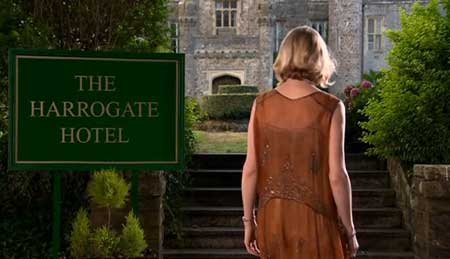Category / doctor who
What Are You Doing Here?
Screenwriters and storytellers, take note: With one simple question, Doctor Who was able to coax motivation out of a character faster than you could play a game of charades. A cheap trick perhaps in wanting your character to want you, but it works!
More obsession along these lines at Waxy.
(via Weekend Stubble)
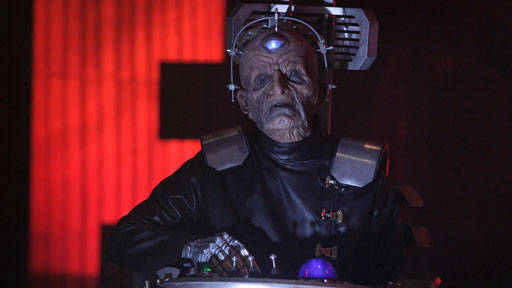
Russell T. Davies’s End

Longtime readers of this blog know of my antipathy for Russell T. Davies’s contributions to Doctor Who. So it was with no expectations whatsoever that I fired up “Journey’s End,” the season finale of Doctor Who, assuming that my intelligence and my emotions would be condescended to and that the fanwankery set into motion last week would be taken to new masturbatory heights. Yes, there was a gratuitous appearance from K-9. Yes, there was the Davros-Sarah Jane Smith showdown referencing “Genesis of the Daleks.” The less said about the phony resolution to last week’s cliffhanger, the better. And I could do without the ridiculous manner in which Earth was transported across the galaxy.
But despite these melodramatic flourishes, this episode worked for me. It was a fitting end to Davies’s tenure on the show, bringing in nearly all of his supporting characters and leaving the Doctor more or less where he started at the beginning. I enjoyed the Daleks floating above Nuremberg speaking German. (Alas, Davies’s German is not so good. He got the German verb for “Exterminate!” wrong. Nevertheless, I enjoyed the Nazi parallels.) I liked Davros questioning the Doctor’s motives, which not only echoed the lone Dalek from “Dalek,” but referenced similar talk of genocide from “Genesis of the Daleks.” Let’s not forget that in “Genesis,” the Doctor asked Davros whether he would let loose a virus that would destroy all forms of alien life. And this quiet reference to the show’s longtime continuity was a surprisingly restrained Davies moment that I have to give him props for.
The whisper into Rose’s ear, the heartening future of Sarah Jane Smith having a 14-year-old, and Donna’s fate suggested unspoken connections that called into question the notion of what it is to be a companion to the Doctor. Traveling with the Doctor, whether as a companion or a viewer, involves being at a specific time and place in one’s life. But Davies reminded us with this finale that no matter where one is at in the series, there’s always a thread one can pick up. So at the end of Davies’s run, I have to thank Davies for using his influence to revive Who, while remaining wary of his overall writing contributions during the past four years. Nevertheless, I have every faith that, in the hands of Steven Moffatt, Who will truly demonstrate its potential to capture our imagination. And I’m glad that Davies closed out the show with a rousing, if problematic denouement, without entirely taking the easy way out.
Having said all this, however, there’s a part of me that wonders if Moffatt will continue portraying Tennant’s Doctor as the amiable metrosexual we all know him to be. To some degree, Tennant is the Alan Alda Doctor. The geeky guy who knows how to order the best wine at an Italian restaurant, but who will probably get his ass kicked in a roadhouse if the cops don’t show up in time. There were a few reminders of the tough Eccleston Doctor in “Journey’s End,” and I believe Tennant is capable of inhabiting this emotional territory. But I certainly hope we begin to see more of the Doctor’s dark side over the next few years. If Moffatt wimps out, I’ll be one of the first to lock his writing contributiosn in my crosshairs.
[RELATED: Worrisome io9 speculation that Moffatt is overrated.]
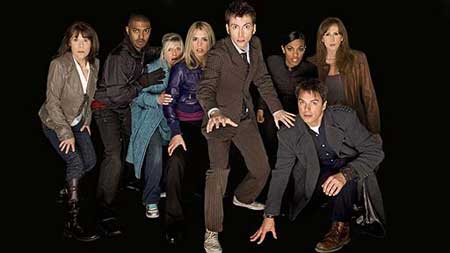
Russell T. Davies: The Hack Who Cried “Bad Wolf”
 This season’s penultimate episode of Doctor Who, “The Stolen Earth,” was a big fuck you to the fans, giving them everything they seemed to want, or that writer Russell T. Davies seemed to think that they wanted. It featured cheeky nods to Torchwood and The Sarah Jane Adventures, the return of Davros (with a ridiculous explanation for how he escaped death), a Richard Dawkins cameo, more holes than a porous street neglected for a decade by a bankrupt city maintenance department, Rose running around Earth with a preposterously gargantuan gun (still no explanation for how she escaped her universe), and an insulting cliffhanger suggesting that we’re getting yet another “it didn’t happen” two-part finale*. Davies even manged to name check Facebook. What next for next week? The Doctor stepping out of the shower, revealing that his real Gallifreyan name is Bobby Ewing, and gallivanting off through time and space with Rose?
This season’s penultimate episode of Doctor Who, “The Stolen Earth,” was a big fuck you to the fans, giving them everything they seemed to want, or that writer Russell T. Davies seemed to think that they wanted. It featured cheeky nods to Torchwood and The Sarah Jane Adventures, the return of Davros (with a ridiculous explanation for how he escaped death), a Richard Dawkins cameo, more holes than a porous street neglected for a decade by a bankrupt city maintenance department, Rose running around Earth with a preposterously gargantuan gun (still no explanation for how she escaped her universe), and an insulting cliffhanger suggesting that we’re getting yet another “it didn’t happen” two-part finale*. Davies even manged to name check Facebook. What next for next week? The Doctor stepping out of the shower, revealing that his real Gallifreyan name is Bobby Ewing, and gallivanting off through time and space with Rose?
I think it’s quite clear that most of us have had enough of Russell T. Davies. The biggest question now is just how much Davies will screw up the show before he hands it off to Steven Moffatt. Keep in mind that we still have a Christmas special and three additional 2009 specials. And every single one of these is to be written by Russell T. Davies.
Yes, I’ll keep watching this train wreck. But between “The Stolen Earth” and this year’s disappointing season of Battlestar, the latter redeemed somewhat by a Planet of the Apes cliffhanger, I’m wondering why I bother. It’s a bit like waiting for George Bush to leave office. With Doctor Who, there’s the hope that the regime change will result in additional intelligence. With Battlestar (new episodes a good year away), it’s hoping that Ronald D. Moore will somehow figure everything out and go out with a bang. But in the meantime, one must sift through a good deal of interstitial dreck. Guess it’s time to dust off the Blake’s 7 and Red Dwarf tapes.
* — I don’t want to reveal what the cliffhanger is for those who haven’t seen it, but if it goes the way I think it will, then it will make Graham Williams’s infamous “let’s try out new bodies” scene for Romana look like Moliere.
[UPDATE: Charlie Anders offers her thought on this fantastic travesty, pointing out, “Since each finale has to top the last, I’m guessing next year would involve a magic virus that turns everyone in the universe into a Sontaran, including Rose, and then the Cybermen from 29 different universes fight with the Gelth, with exploding ribbons! Spoilers for what actually did happen ahead.” Indeed. I must confess that I have a morbid curiosity as to just how much of a mess RTD is going to make for Moffatt. It’s almost as if the man is determined to create a massive continuity clusterfuck that will take at least three seasons to sort out. As for the heartbeat that Donna hears, am I the only one who thinks that this is actually the Dalek heartbeat? I mean, the heartbeat in question had the same intonation and everything. Seemed like this was a foreshadowing to Donna transforming into a Dalek and her character being killed off the show. That’s my prediction at any rate.]
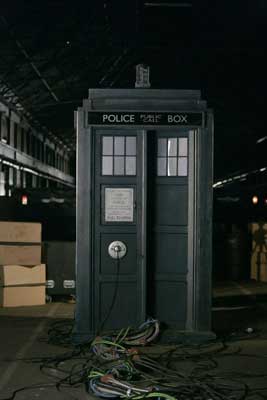
The Last Days of Russell T. Davies
“Turn Left” isn’t quite as appalling as last year’s “This didn’t really happen” two-part Doctor Who finale. But it’s still filled with Russell T. Davies’s insufferable complacency. There doesn’t appear to be much of a purpose to this episode, other than for Davies to remind the Who fans just what he’s given them. It reminded me of the childish “Dimensions in Time” promotional nonsense that John Nathan-Turner was once deservedly ridiculed for, but that Who fans now accept without question. (I also don’t think it was an accident that we were given a moment in which the TARDIS was gutted by Torchwood, with numerous wires and cables affixed to the dying police box. There seemed something metaphorical here about Davies’s relationship with the show.)
 Now I’ll give Davies last week’s “Midnight.” Once you got past that episode’s first ten minutes of touchy-feely nonsense (Wow! A lesbian!), Davies did spin a half-decent claustrophobic yarn, helped in part by Alice Troughton’s crisp direction and the fascinating bigotry channeled by David Troughton. But let’s face it. On the whole, Davies’s writing contributions have amounted to little more than camp, politically correct casting, and speculative fiction premises that are about as cutting-edge as a Betty Crocker recipe unleashed at an Eisenhower fundraising event.
Now I’ll give Davies last week’s “Midnight.” Once you got past that episode’s first ten minutes of touchy-feely nonsense (Wow! A lesbian!), Davies did spin a half-decent claustrophobic yarn, helped in part by Alice Troughton’s crisp direction and the fascinating bigotry channeled by David Troughton. But let’s face it. On the whole, Davies’s writing contributions have amounted to little more than camp, politically correct casting, and speculative fiction premises that are about as cutting-edge as a Betty Crocker recipe unleashed at an Eisenhower fundraising event.
“Turn Left” reminds us of the reprehensible fat blob babies from “Partners in Crime,” the disappearing hospital from “Smith and Jones,” and numerous other references to the last four years that suggest deep import. But it’s been Paul Cornell, Mark Gatiss, Robert Shearman, and Steven Moffatt’s scripts that have offered originality and intelligence, and have kept the show rolling. (The less said about Helen Raynor’s “give the people what they want at the expense of Who mythology” two-parters, the better.)
That insectoid on Donna’s back was about as convincing as a leftover prop from a Roger Corman cheapie. Hell, Alpha Centuari, that silly six-armed alien from the Pertwee Peladon stories, was more convincing. And you want to know why? Because at least that silly supporting character had heart. The unspeaking insect was utterly ridiculous in its purpose and its motivations. “Turn Left”‘s premise, complete with the insultingly pedestrian paradox presented in the episode’s title, was bullshit. We’re expected to believe that the Doctor wouldn’t regenerate after being smitten down by a spider queen. Never mind that the Timelord was able to regenerate after being poisoned by spectrox toxaemia. Rose Tyler appears from another universe that she was supposedly trapped in without any reasonable explanation. And it has long been clear to anyone watching the show that the Doctor is useless without his companions. So why ramrod this point into the audience’s noggins?
Next week sees the first of a two-part finale featuring Captain Jack, Daleks, three companions, and a partridge in a pear tree. It too is written by Russell T. Davies. And I fear the worst. I hope that some of the “Midnight” special comes through. But until Russell T. Davies is gone permanently, I suspect that I will be forced to drink copious amounts of bourbon to cope with Davies’s unpardonable tamperings.
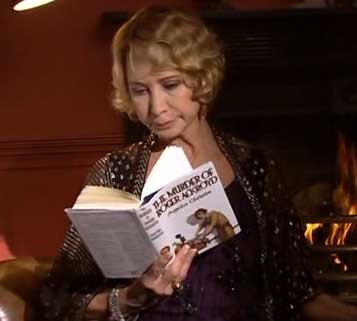
Oh Come On, Russell T. Davies
I have been watching an episode of Doctor Who called “The Unicorn and the Wasp” that is set around Agatha Christie’s disappearance. The giant wasp flying around, in clear defiance of the laws of gravity, is bad enough. But I cannot for the life of me accept an episode that includes the following story holes:
1. Despite the fact that Agatha Christie disappeared for eleven days in December 1926, everything outside is inexplicably sunny. And the formal wear is inexplicably summery. No snow or winter winds, eh?
2. Donna, the companion played by Catherine Tate, brings up Miss Marple, who Christie introduced in December 1927 (“The Tuesday Night Club,” Issue 350 of The Royal Magazine), the year after her disappearance. This is a neat effort on Roberts’s part to suggest Christie being influenced by Donna. The problem is that Christie got the name from a railway station she was stranded in. Noticing the sign, the name stuck.
3. Donna also references “talking pictures” and Agatha Christie is baffled by such a concept. Actually, talking pictures were already showing as shorts. Before The Jazz Singer appeared in 1927, Al Jolson spoke in the 1926 Vitaphone short, “A Plantation Act.” And cinema with sound wasn’t entirely a crazed concept.
4. In front of an entire kitchen staff, the Doctor performs a wild pantomine and, using his Gallifrey biology, manages to escape cyanide poisoning. Everybody, including Christie (who was a nurse), accepts this preternatural discovery without a second thought. The next cut has everybody seated at dinner.
5. Where is Agatha Christie’s daughter? As I understand it, she went upstairs to kiss her shortly before disappearing.
I’m about 25 minutes into this, and I’ve now almost totally lost interest in the story. I can suspend disbelief up to a point. But when the writers clearly think so little of audience intelligence, when they cannot perform even the most rudimentary research on a major figure who, quite frankly, I’m hardly an expert on (all of the above, with the exception of the story reference, was lifted from my noggin) — a British icon, no less — one wonders whether there was even anyone trying for accuracy on this. And then one is reminded that Russell T. Davies remains the producer. The handoff to Steven Moffatt cannot happen fast enough.
UPDATE: Okay, maybe I’m just being too damn picky, but surely the art director on Doctor Who could have spent more time getting the title font kerning right, as well as making sure the artist’s signature was there the woman’s skirt. The drop shadows are off too.
A still from the episode:

The dust jacket from the 1926 edition of The Murder of Roger Ackroyd:
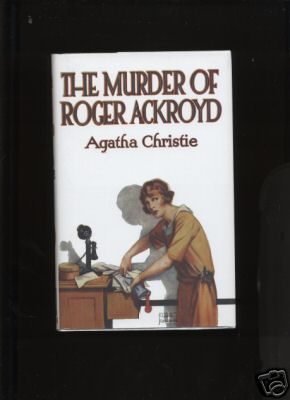
And here’s a closer shot. The woman is arched over too much. And I’m wondering if the actor is holding the book in that way because the art director messed up something on the lower left-hand corner.
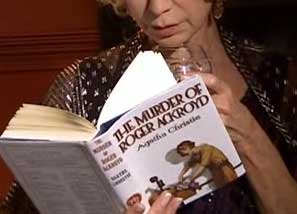
And here’s Agatha Christie returning after her disappearance to the Harrogate Hydropathic Hotel, with a hilarious modern-looking sign and an exterior that looks nothing like the place (now called the Old Swan Hotel).
